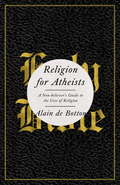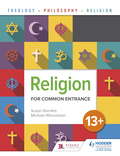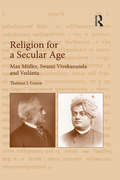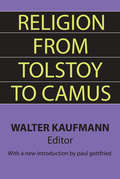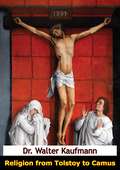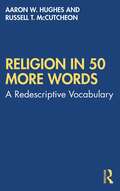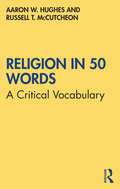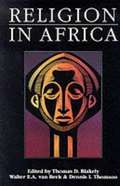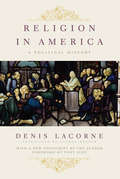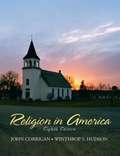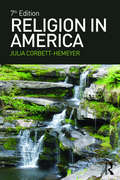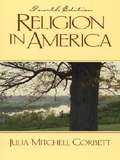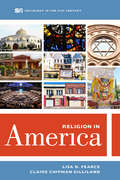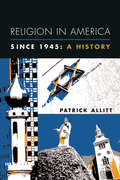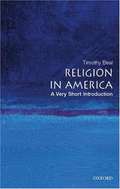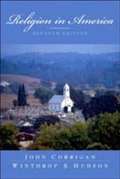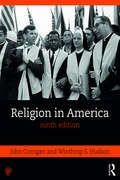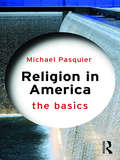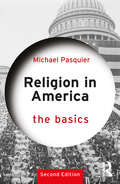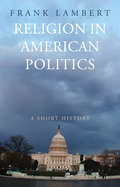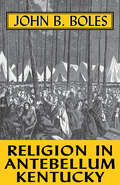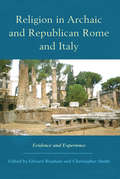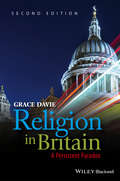- Table View
- List View
Religion for Atheists
by Alain De BottonWhat if religions are neither all true nor all nonsense? The long-running and often boring debate between fundamentalist believers and non-believers is finally moved forward by Alain de Botton's inspiring new book, which boldly argues that the supernatural claims of religion are entirely false--but that it still has some very important things to teach the secular world. Religion for Atheists suggests that rather than mocking religion, agnostics and atheists should instead steal from it--because the world's religions are packed with good ideas on how we might live and arrange our societies. Blending deep respect with total impiety, de Botton (a non-believer himself) proposes that we look to religion for insights into how to, among other concerns, build a sense of community, make our relationships last, overcome feelings of envy and inadequacy, inspire travel and reconnect with the natural world. For too long non-believers have faced a stark choice between either swallowing some peculiar doctrines or doing away with a range of consoling and beautiful rituals and ideas. At last, in Religion for Atheists, Alain de Botton has fashioned a far more interesting and truly helpful alternative.
Religion for Common Entrance 13+
by Michael Wilcockson Susan GrenfellTrust the experts; let Religious Studies specialists Susan Grenfell and Michael Wilcockson guide you through the new World Religions content of the 2018 ISEB Theology, Philosophy and Religion syllabus for Common Entrance 13+.- Enables students to develop and review their knowledge through discussion points and a variety of activities designed to encourage active research and engagement- Builds the skills that students need for the exam by providing questions that focus on the three assessment objectives- Boosts students' confidence approaching assessment with exam-style practice questions at the end of each section- Offers a flexible route through the new syllabus with clear coverage of all six world religionsThis Student Book is fully supported by the accompanying Teacher Resource Book, which contains helpful Teachers' Overviews for each chapter, guidance on delivering the content and classroom-ready worksheets.
Religion for a Secular Age: Max Müller, Swami Vivekananda and Vedānta
by Thomas J. GreenReligion for a Secular Age provides a transnational history of modern Vedānta through a comparative study of two of its most important exponents, Friedrich Max Muller (1823–1900) and Swami Vivekananda (1863–1902). This book explains why Vedānta's appeal spanned the ostensibly very different contexts of colonial India and Victorian Britain and America, and how this ancient form of thought was translated by Muller and Vivekananda into a modern form of philosophy or religion. These religiously-committed men attempted to reconcile religion with modernity by appealing to Advaita (literally, 'non-dualistic') Vedānta's monistic interpretation of reality. The 'scientific' study of religion allegedly demonstrated the evolutionary superiority of Vedānta and the possibility of religion's survival in 'the light of modern science'. They believed Vedānta could also provide the religious basis for moral engagement in this world, even as the hold of orthodox Christianity and traditional Hinduism appeared to be weakening. Vedānta thus served as a way of articulating a form of religion suitable for a secular age – religion which has embraced modern forms of thought while breaking away from creeds, scriptures and institutions to thrive in the spheres of public debate of London, Calcutta and New York.
Religion from Tolstoy to Camus
by Walter Kaufmann Paul GottfriedWalter Kaufmann devoted his life to exploring the religious implications of literary and philosophical texts. Deeply skeptical about the human and moral benets of modern secularism, he also criticized the quest for certainty pursued through dogma. Kaufmann saw a risk of loss of authenticity in what he described as unjustied retreats into the past. This is a compilation of signicant texts on religious thought that he selected and introduced.
Religion from Tolstoy to Camus
by Walter KaufmannFirst published in 1961, this volume brings together basic writings and religious truths and morals from a wide range of sources.Tolstoy, Dostoevsky, Plus II, Leo XIII, Nietzsche, James, Royce, Wilde, Freud, Niemöller, Barth, Maritain, Tillich, Schweitzer, Buber, Camus, and others, all have sought the religious truth about man, and have in the last three quarters of our century made great contributions to religious thought, critical often of the accepted and fashionable religion of their day, but greatly concerned to purify religion as they understood it.Dr. Waller Kaufman, of Princeton University, who has already written extensively on philosophy and religion, supplies an editorial and critical note for each of his subject, thus providing valuable continuity and evaluation.Such a book as this deserves a place in all libraries, public and private, so that it will be possible to quote these men from knowledge, rather than hearsay many times removed from the original.“The point is not to win friends for religion, or enemies, but to provoke greater thoughtfulness. Here are texts that deserve to be pondered and discussed. Some of them I have criticized in other volumes; in such cases, the references are given. But in the present book nothing is included merely to be disparaged, nor is anything offered only to be praised. The hope is that those who read this book will gain a deeper understanding of religion.”—Walter Kaufmann, Preface
Religion in 50 More Words: A Redescriptive Vocabulary
by Aaron W. Hughes Russell T. McCutcheonReligion in 50 More Words: A Redescriptive Vocabulary provides a succinct historical, social, and political examination of some of the key words used in the modern study of religion. Differing from the first volume’s more theoretical focus, this volume analyzes more common first order descriptive terms that are used throughout the field, inviting readers to theorize their traditional vocabulary. Topics covered include: • Atheism/Theism • Conversion • Cult • Evil • Fundamentalism • Idol • Magic • Pilgrimage • Ritual • Sacrifice Religion in 50 More Words submits such terms to a critical interrogation and subsequent redescription. This paves the way for a collective and more critical reframing of the field. The volume, along with Religion in 50 Words, provides an indispensable resource for students and academics working in the field of religious studies and cognate disciplines.
Religion in 50 Words: A Critical Vocabulary
by Aaron W. Hughes Russell T. McCutcheonReligion in 50 Words: A Critical Vocabulary is the first of a two-volume work that seeks to transform the study of religion by offering a radically critical perspective. It does so by providing a succinct and critical examination of the key words used in the modern study of religion. Arranged alphabetically, the book explores the historic roots, varied uses, and current significance and utility of the technical terms used within the current field of religious studies. These are the terms that both students and scholars routinely deploy to think about, describe, and analyze data—sometimes without realizing that they are themselves technical tools in need of attention. Among the topics covered: Belief Critical Culture Definition Environment Gender Ideology Lived religion Material religion Orthodoxy Politics Race Sacred/profane Secular Theory This book submits all of its terms to a critical interrogation and subsequent re-description, thereby allowing a collective reframing of the field. This volume is an indispensable resource for students and academics working in religious studies.
Religion in Africa: Experience and Expression
by Thomas D. Blakely Walter E. A. Van Beek Dennis L. ThompsonThis is a major collection on the subject of African religion. It is part of a continuous stock-taking solidly grounded in archival and field research in Africa and the African diasporas. This book provides the views of some of the most distinguished academics in the context of African history, anthropology, archaeology, politics, comparative religions, health and healing, languages and literatures, and the visual and performingarts.
Religion in America
by Tony Judt George Holoch Denis LacorneAmerica is unique in that its political institutions preceded the development of a national identity. The American Revolution and drafting of the constitution did not deepen a preexisting national self. Rather, it created a new political framework to which the "walls" of culture, particularly references to a distant past, were later added. Revisiting this moment in American history and the nation's early efforts at identity, Denis Lacorne identifies two competing narratives drawn from a reformulation of America's past, present, and future.The first narrative, derived from the philosophy of the Enlightenment, is essentially secular. Associated with the Founding Fathers and reflected in the Declaration of Independence, the Constitution, and the Federalist Papers, it is predicated on separating religion from politics to preserve political freedom from an overpowering church. Prominent thinkers such as Voltaire, Thomas Paine, and Jean-Nicolas Démeunier, who viewed the American project as a radical attempt to create a new regime free from religion and the weight of ancient history, embraced the American effort to establish a genuine "wall of separation" between church and state. The second narrative casts national identity as the outcome of a progression toward freedom, beginning with the Reformation and culminating with the colonies of Puritan New England. This alternative vision was adopted by Whig politicians and romantic historians, yet still persists among political scientists such as Samuel Huntington. These thinkers insist that America has a core, stable "American creed" based on a mix of Protestant and republican values. Lacorne outlines the role of religion in the making of these narratives and examines, against this background, how key historians, philosophers, novelists, and intellectuals situate religion in American politics.
Religion in America
by Tony Judt George Holoch Denis LacorneAmerica is unique in that its political institutions preceded the development of a national identity. The American Revolution and drafting of the constitution did not deepen a preexisting national self. Rather, it created a new political framework to which the "walls" of culture, particularly references to a distant past, were later added. Revisiting this moment in American history and the nation's early efforts at identity, Denis Lacorne identifies two competing narratives drawn from a reformulation of America's past, present, and future.The first narrative, derived from the philosophy of the Enlightenment, is essentially secular. Associated with the Founding Fathers and reflected in the Declaration of Independence, the Constitution, and the Federalist Papers, it is predicated on separating religion from politics to preserve political freedom from an overpowering church. Prominent thinkers such as Voltaire, Thomas Paine, and Jean-Nicolas Démeunier, who viewed the American project as a radical attempt to create a new regime free from religion and the weight of ancient history, embraced the American effort to establish a genuine "wall of separation" between church and state. The second narrative casts national identity as the outcome of a progression toward freedom, beginning with the Reformation and culminating with the colonies of Puritan New England. This alternative vision was adopted by Whig politicians and romantic historians, yet still persists among political scientists such as Samuel Huntington. These thinkers insist that America has a core, stable "American creed" based on a mix of Protestant and republican values. Lacorne outlines the role of religion in the making of these narratives and examines, against this background, how key historians, philosophers, novelists, and intellectuals situate religion in American politics.
Religion in America
by John Corrigan Winthrop HudsonThis comprehensive narrative account of religion in America from 1607 through the present depicts the religious life of the American people within the context of American society. It addresses topics ranging from the European/Puritan origins of American religious thought, the ramifications of the "Great Awakening", the effect of nationhood on religious practice, and the shifting religious configuration of the late 20th century.
Religion in America
by Julia Corbett HemeyerReligion in America, 7th Edition provides a comprehensive yet concise introduction to the changing religious landscape of the United States. Extensively revised and updated to reflect current events and trends, this new edition continues to engage students in reflection about religious diversity. Julia Corbett-Hemeyer presents the study of religion as a tool for developing appreciation of communities of faith other than one’s own and for understanding the dynamics at work in religion in the United States today.?
Religion in America (4th edition)
by Julia Mitchell CorbettThis text might be used in a course titled "religion appreciation." Corbett (religious studies, Ball State U.) offers an introduction to a variety of religious groups in the United States and stresses the diversity of the American religious scene in order to accentuate understanding of other communities of faith. Each chapter offers suggestions for further reading and relevant Web sites, as well as questions and activities to aid teachers in discussions and writing assignments.
Religion in America (Sociology in the Twenty-First Century #6)
by Lisa D. Pearce Claire Chipman GillilandWritten in an engaging and accessible tone, Religion in America probes the dynamics of recent American religious beliefs and behaviors. Charting trends over time using demographic data, this book examines how patterns of religious affiliation, service attendance, and prayer vary by race and ethnicity, social class, and gender. The authors identify demographic processes such as birth, death, and migration, as well as changes in education, employment, and families, as central to why some individuals and congregations experience change in religious practices and beliefs while others hold steady. Religion in America challenges students to examine the demographic data alongside everyday accounts of how religion is experienced differently across social groups to better understand the role that religion plays in the lives of Americans today and how that is changing.
Religion in America Since 1945: A History (Columbia Histories of Modern American Life)
by Patrick AllittMoving far beyond the realm of traditional "church history," Patrick Allitt here offers a vigorous and erudite survey of the broad canvas of American religion since World War II. Identifying the major trends and telling moments within major denominations and also in less formal religious movements, he asks how these religious groups have shaped, and been shaped by, some of the most important and divisive issues and events of the last half century: the Cold War, the Civil Rights Movement, the Vietnam War, feminism and the sexual revolution, abortion rights, the antinuclear and environmentalist movements, and many others. Allitt argues that the boundaries between religious and political discourse have become increasingly blurred in the last fifty years. Having been divided along denominational lines in the early postwar period, religious Americans had come by the 1980s to be divided along political lines instead, as they grappled with the challenges of modernity and secularism. Partly because of this politicization, and partly because of the growing influence of Asian, Latino, and other ethnic groups, the United States is anomalous among the Western industrialized nations, as church membership and religious affiliation generally increased during this period. Religion in America Since 1945 is a masterful analysis of this dynamism and diversity and an ideal starting point for any exploration of the contemporary religious scene.
Religion in America: A Political History (Religion, Culture, and Public Life #7)
by Denis LacorneDenis Lacorne identifies two competing narratives defining the American identity. The first narrative, derived from the philosophy of the Enlightenment, is essentially secular. Associated with the Founding Fathers and reflected in the Declaration of Independence, the Constitution, and the Federalist Papers, this line of reasoning is predicated on separating religion from politics to preserve political freedom from an overpowering church. Prominent thinkers such as Voltaire, Thomas Paine, and Jean-Nicolas Démeunier, who viewed the American project as a radical attempt to create a new regime free from religion and the weight of ancient history, embraced this American effort to establish a genuine "wall of separation" between church and state. The second narrative is based on the premise that religion is a fundamental part of the American identity and emphasizes the importance of the original settlement of America by New England Puritans. This alternative vision was elaborated by Whig politicians and Romantic historians in the first half of the nineteenth century. It is still shared by modern political scientists such as Samuel Huntington. These thinkers insist America possesses a core, stable "Creed" mixing Protestant and republican values. Lacorne outlines the role of religion in the making of these narratives and examines, against this backdrop, how key historians, philosophers, novelists, and intellectuals situate religion in American politics.
Religion in America: A Very Short Introduction
by Timothy BealIt's hard to think of a single aspect of American culture, past or present, in which religion has not played a major role. The roles religion plays, moreover, become more bewilderingly complex and diverse every day. For all those who want--whether out of curiosity, necessity, or civic duty--a vivid picture and fuller understanding of the current reality of religion in America, this Very Short Introduction is the go-to book they need. Timothy Beal describes many aspects of religion in contemporary America that are typically ignored in other books on the subject, including religion in popular culture and counter-cultural groups; the growing phenomenon of "hybrid" religious identities, both individual and collective; the expanding numbers of new religious movements, or NRMs, in America; and interesting examples of "outsider religion," such as Paradise Gardens in Georgia and the People Love People House of God in Ohio. He also offers an engaging overview of the history of religion in America, from Native American traditions to the present day. Beal sees three major forces shaping the present and future of religion in America: first, unprecedented religious diversity, which will continue to grow in the decades to come; second, the information revolution and the emergence of a new network society; and third, the rise of consumer culture. Taken together, these forces offer the potential to create a new American pluralism that would enrich society in unimaginable ways, but they also threaten the great ideal of e pluribus unum. With visual aids that help readers navigate America's diverse religious landscape, this informative, thoughtful, and provocative book is a must-read in the emerging public conversation concerning religion in America.
Religion in America: An Historical Account of the Development of American Religious Life (7th edition)
by John Corrigan Winthrop S. HudsonThe history of religion in the United States.
Religion in America: Concepts Of American Identity And Mission
by John Corrigan Winthrop HudsonThis comprehensive narrative account of religion in America from the sixteenth century through the present depicts the religious life of the American people within the context of American society. It addresses topics ranging from the European origins of American religious thought and the diversity of religion in America, to the relation of nationhood with religious practice and the importance of race, ethnicity, and gender in American religious history. Split into four parts this textbook covers: Religion in a Colonial Context, 1492-1789 The New Nation, 1789-1865 Years of Midpassage, 1865-1918 Modern America, 1918- Present This new edition has been thoroughly updated to include further discussion of colonialism, religious minorities, space and empire, religious freedom, emotion, popular religion, sexuality, the ascent of the "nones," Islamophobia, and the development of an American mission to the world. With a detailed timeline, illustrations and maps throughout, and an accompanying companion website Religion in America is the perfect introduction for students new to the study of this topic who wish to understand the key themes, places, and people who shaped the world as we know it today.
Religion in America: French Missionaries And The Roman Catholic Priesthood In The United States, 1789-1870 (The Basics)
by Michael PasquierReligion in America: The Basics is a concise introduction to the historical development of religions in the United States. It is an invitation to explore the complex tapestry of religious beliefs and practices that shaped life in North America from the colonial encounters of the fifteenth century to the culture wars of the twenty-first century. Far from a people unified around a common understanding of Christianity, Religion in America: The Basics tracks the steady diversification of the American religious landscape and the many religious conflicts that changed American society. At the same time, it explores how Americans from a variety of religious backgrounds worked together to face the challenges of racism, poverty, war, and other social concerns. Because no single survey can ever satisfy the need to know more and think differently, Religion in America prepares readers to continue studying American religions with their own questions and perspectives in mind.
Religion in America: The Basics (The Basics)
by Michael PasquierReligion in America: The Basics is a concise introduction to the historical development of religions in the United States. It is an invitation to explore the complex tapestry of religious beliefs and practices that shaped life in North America from the colonial encounters of the fifteenth century to the culture wars of the twenty-first century. Far from a people unified around a common understanding of Christianity, Religion in America: The Basics tracks the steady diversification of the American religious landscape and the many religious conflicts that have changed American society. At the same time, it explores how Americans from a variety of religious backgrounds worked together to face the challenges of racism, poverty, war, and other social concerns. This thoroughly revised second edition now covers the Obama and Trump administrations, Black Lives Matter, Christian nationalism, pluralism, and the development of the "nones" and the "unaffiliated." With each chapter featuring concise summaries and suggested further readings, this book is an invaluable resource for students approaching the history of religion in America for the first time.
Religion in American Politics: A Short History
by Frank LambertThe delegates to the 1787 Constitutional Convention blocked the establishment of Christianity as a national religion. But they could not keep religion out of American politics. From the election of 1800, when Federalist clergymen charged that deist Thomas Jefferson was unfit to lead a "Christian nation," to today, when some Democrats want to embrace the so-called Religious Left in order to compete with the Republicans and the Religious Right, religion has always been part of American politics. In Religion in American Politics, Frank Lambert tells the fascinating story of the uneasy relations between religion and politics from the founding to the twenty-first century. Lambert examines how antebellum Protestant unity was challenged by sectionalism as both North and South invoked religious justification; how Andrew Carnegie's "Gospel of Wealth" competed with the anticapitalist "Social Gospel" during postwar industrialization; how the civil rights movement was perhaps the most effective religious intervention in politics in American history; and how the alliance between the Republican Party and the Religious Right has, in many ways, realized the founders' fears of religious-political electoral coalitions. In these and other cases, Lambert shows that religion became sectarian and partisan whenever it entered the political fray, and that religious agendas have always mixed with nonreligious ones. Religion in American Politics brings rare historical perspective and insight to a subject that was just as important--and controversial--in 1776 as it is today.
Religion in Antebellum Kentucky
by John B. BolesA look at the Christian religions in the Bluegrass State before the Civil War from the author of the acclaimed Jefferson: Architect of American Liberty.Religion permeated the day-to-day life of antebellum Kentucky. This engaging account of Kentucky’s various Christian denominations, first published as part of the Kentucky Bicentennial Bookshelf, traces the history of the Great Revival of 1800–1805, the subsequent schism in Protestant ranks, the rise of Catholicism, the development of a distinctive black Christianity, and the growth of a Christian antislavery tradition.Paying special attention to the role of religion in the everyday life of early Kentuckians and their heritage, John B. Boles provides a concise yet enlightening introduction to the faith and the people of the Bluegrass State. Religion in Antebellum Kentucky is an excellent survey of religion and its significance in the first eighty-five years of Kentucky’s history.“A small historical gem . . . Boles has set an admirable standard of excellence for this sort of study.” —William and Mary Quarterly
Religion in Archaic and Republican Rome and Italy: Evidence and Experience
by Christopher Smith Edward BisphamFirst Published in 2001. Routledge is an imprint of Taylor & Francis, an informa company.
Religion in Britain: A Persistent Paradox
by Grace DavieReligion in Britain evaluates and sheds light on the religious situation in twenty-first century Britain; it explores the country’s increasing secularity alongside religion’s growing presence in public debate, and the impact of this paradox on Britain’s society. Describes and explains the religious situation in twenty-first century Britain Based on the highly successful Religion in Britain Since 1945 (Blackwell, 1994) but extensively revised with the majority of the text re-written to reflect the current situation Investigates the paradox of why Britain has become increasingly secular and how religion is increasingly present in public debate compared with 20 years ago Explores the impact this paradox has on churches, faith communities, the law, politics, education, and welfare
